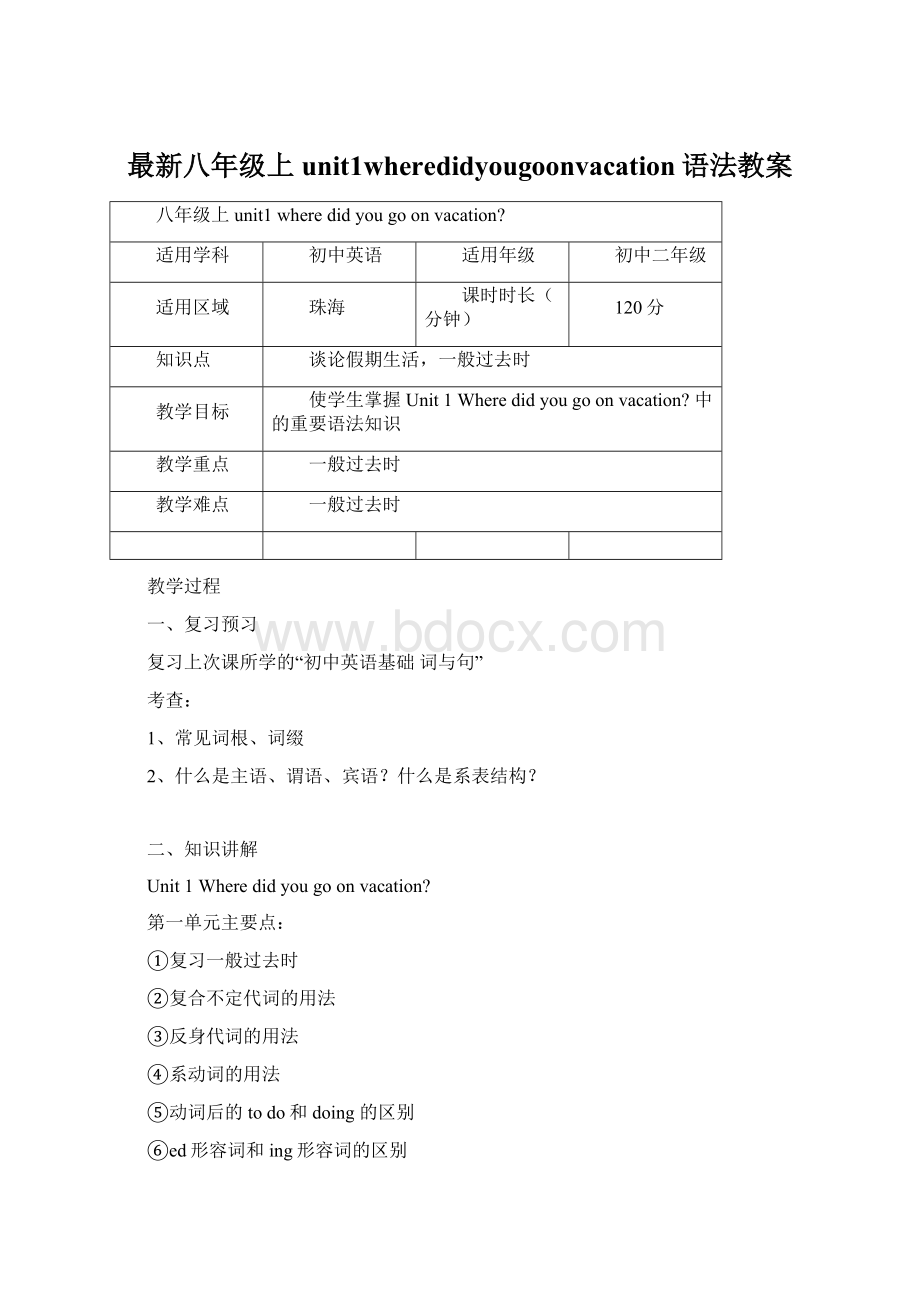最新八年级上unit1wheredidyougoonvacation语法教案.docx
《最新八年级上unit1wheredidyougoonvacation语法教案.docx》由会员分享,可在线阅读,更多相关《最新八年级上unit1wheredidyougoonvacation语法教案.docx(10页珍藏版)》请在冰豆网上搜索。

最新八年级上unit1wheredidyougoonvacation语法教案
八年级上unit1wheredidyougoonvacation?
适用学科
初中英语
适用年级
初中二年级
适用区域
珠海
课时时长(分钟)
120分
知识点
谈论假期生活,一般过去时
教学目标
使学生掌握Unit1Wheredidyougoonvacation?
中的重要语法知识
教学重点
一般过去时
教学难点
一般过去时
教学过程
一、复习预习
复习上次课所学的“初中英语基础词与句”
考查:
1、常见词根、词缀
2、什么是主语、谓语、宾语?
什么是系表结构?
二、知识讲解
Unit1Wheredidyougoonvacation?
第一单元主要点:
①复习一般过去时
②复合不定代词的用法
③反身代词的用法
④系动词的用法
⑤动词后的todo和doing的区别
⑥ed形容词和ing形容词的区别
⑦“近义词”的区别
⑧本单元中的主谓一致现象
⑨动词过去式的构成及不规则动词表
⑩用同义短语转换同义句时谓语动词形式一致性的培养。
⑾感叹句的结构和连词的选择。
三、例题精析与课堂运用
一、词组、短语
1、goonvacation去度假,
2、stayathome呆在家,
3、gotothemountains上山/进山,
4、gotothebeach到海边去,
5、visitmuseums参观博物馆,
6、gotosummercamp去夏令营,
7、quiteafew相当多,
8、studyfor为……学习,
9、goout出去,
10、mostofthetime大部分时间/绝大多数时间,
11、tastegood尝起来味道好,
12、haveagoodtime玩的开心,
13、ofcourse当然可以,
14、feellike感觉像……/想要,
15、goshopping购物,
16、inthepast在过去,
17、walkaround绕……走,
18、toomany太多(可数名词前面),
19、becauseof因为,
20、onebowlof一碗……,
21、findout查出来/发现,
22、goon继续,
23、takephotos照相,
24、somethingimportant重要的事情,
25、upanddown上上下下,
26、comeup出来
二、重要句子(语法):
Wheredidyougoonvacation?
你到哪里去度假了?
IwenttoNewYorkCity.我去了纽约城
Didyougooutwithanyone?
你出去带了人吗?
No,Noonewashere.Everyonewasonvacation.不,没有人在这儿大家度去度假了。
Didyoubuyanythingspecial?
你买了什么特别的东西吗?
Yes,Iboughtsomethingformyfather.对,我给父亲买了一些东西。
Howwasthefood?
食物怎么样?
Everythingtastedreallygood.每一样东西真的都好吃。
Dideveryonehaveagoodtime?
大家玩的开心吗?
Oh,yes.Everythingwasexcellent.对,一切都很精彩。
三、习惯用法、搭配
1.buysth.forab./buysb.sth.为某人买某物
2.taste+adj.尝起来……
3.nothing….but+V.(原形)除了……之外什么都没有
4.seem+(tobe)+adj看起来
5.arrivein+大地方/arriveat+小地方到达某地
6.decidetodosth.决定做某事
7.trydoingsth.尝试做某事/trytodosth.尽力做某事
8.enjoydoingsth.喜欢做某事
9.wanttodosth.想去做某事
10.startdoingsth.开始做某事11.stopdoingsth.停止做某事
12.look+adj看起来
13.dislikedoingsth.不喜欢做某事
14.Whynotdosth.为什么不做…….呢?
15.so+adj+that+从句如此……以至于……
16.tellsb.(not)todosth.告诉某人(不要)做某事
17.keepdoingsth.继续做某事/一直做某事
18.forgettodosth.忘记去做某事/forgetdoingsth忘记做过某事
四、词语辨析:
1)something,anything,nothing,everything是指物的不定代词。
somebody,someone,anybody,anyone,nobody,everybody,everyone是指人的不定代词。
somewhere,anywhere,nowhere,everywhere是指地点的不定副词。
2)当形容词修饰不定代词、不定副词时,放于其后;somethingspecial;somewherewonderful.
3)不定代词、不定副词做主语时,谓语动词用第三人称单数。
如:
Iseverybodyhere?
大家都到齐了吗?
4)something,somebody,someone,somewhere用于肯定句及表示请求或建议的疑问句中,而anything,anybody,anyone,anywhere用于否定句、疑问句及条件状语从句中。
如:
Didyoudoanythinginteresting?
你做了有趣的事吗?
(表疑问)
Whydon’tyouvisitsomeonewithme?
你为什么不跟我一起去拜访下某个人呢?
(表建议)
Ifanythinghappens,pleasetellme.如果有事情发生,请告诉我。
注:
地点副词home,here,there前介词省略)
辨析:
1.getto/reach/arrive都是“到达“的意思
getto+地点=reach+地点=arriveat+地点(小)=arrivein+地点(大)
注意:
若他们后面要加地点副词here,there,home等,则不需要加介词。
2.nothing...butdosth.意为“除......之外;只有”,如:
IhavenothingtodobutwatchTValldaylong.我整天除了看电视什么也没干。
3.feellike意为:
“感受到;摸起来”,后跟宾语从句或名词。
如:
IfeltlikeIwasabird.我感觉我是一只鸟。
Itfeelslikeastone.它摸起来像一块石头。
另外,构成短语feellikedoingsth.意为“想做某事”。
如:
Ifeellikeeating.我想吃东西。
4.enjoydoingsth.喜欢做…;乐意做…
enjoyoneself过得愉快=havefun/haveagoodtime.
11.如此…以致于(结果)
.MylegsweresotiredthatIwantedtostop.我的双腿太累了以至于我都想停下来。
(P8)
so+形/副+that从句:
Sheissopopularthateveryonelikesher.
such+名短+that从句:
Sheissuchapopulargirlthateveryonelikesher.
1).Heis____lovelyaboy____welovehimverymuch.
2).Thelittleboyis__youngthathecan’tgotoschool.
12.sothat从句:
以便(目的)如:
Hegetsupearlysothathecancatchtheearlybus.
13.Myclassmatestoldmetokeepgoing,soIwenton.我的同学告诉我坚持往前走,因此我便继续前进了
1)tellsb.(not)todosth.意为“告诉某人(不要)做某事。
Theteacher________________________thewindowjustnow.老师刚才告诉我们擦窗户。
2)keepdoingsth.意为“继续做某事,一直做某事”。
She____________TVfortwohourslastnight.昨晚她持续看了两个小时的电视。
14.Whatadifferenceadaymakes!
一天的差异多大啊!
常用的感叹句的结构:
1)What+adj.+复数名词/不可数名词+主语+谓语!
2)What+a/an+adj.+可数名词单数+主语+谓语!
3)How+adj.+a/an+可数名词单数+主语+谓语!
4)How+adj./adv.+主语+谓语!
eg:
1.Whataninterestingbookitis!
=Howinterestingabookis!
那本书多么有趣啊!
2.____aclevergirlsheis!
A.WhoB.WhatC.HowD.Where
3._____cleveragirlsheis!
A.WhoB.WhatC.HowD.Where
4._____importantjobstheydid!
A.WhatB.WhoC.HowD.Where
5._____sweetwateritis!
A.WhoB.WhatC.WhereD.How
6._____interestingthedogis!
A.WhoB.WhatC.WhereD.How
15.反身代词:
myself,ourselves,yourself,yourselves,himself,herself,itself,themselves.
作动词或介词的宾语:
经常在enjoy,teach,hurt,buy,introduce,dress,kill等动词和by,for,to,of等介词后作宾语。
HeisteachinghimselfEnglish.她在自学英语。
Shewastalkingtoherself.她自言自语。
Helivesbyhimselfinthecountry.他独自住在乡下。
1)Helpyourself!
请随便吃吧!
/请自己去取吧!
2)Makeyourselfathome!
别客气!
3)makeyourselfheard/understood.使你的话被人听得见/理解
4)teachoneself自学=learnbyoneself
5)byoneself独自
6)foroneself为自己;替自己
7)enjoyoneself玩的愉快
8)dressoneself给自己穿衣
16.Wewaitedoveranhourforthetrainbecausethereweretoomanypeople.因为人太多,所以我们等了一个多小时的火车。
1)waitfor意为“等候”,其后可接人或物。
Tomwaswaitingforabusoverthere.
2)over介词,意为“多于;超过”,相当于morethan。
Eg:
Myfatherisover40yearsold.
Thereareovereighthundredstudentsinourschool.
3)toomany意为“太多”,其后接可数名词复数。
Healwayshastoomanyquestionstoaskme.
辨析:
toomany+可数名词复数意为“太多...”
toomuch+不可数名词意为“太多...”
muchtoo+形容词意为“太...”
eg:
Ihavehomeworktodotoday.
课程小结
课后作业
送人□有实用价值□装饰□一、单项填空(第小题1分,共15分)
5、你认为一件DIY手工艺制品在什么价位可以接受?
1.Are you good at________ popular songs?
A.sing B.singing C.to sing D.sing
2. Please look after your________and keep_________.
A.health,health B.healthy,healthy C.health,healthy D.healthy,health
3. It’s time _______our class,now.
A.begin B.to begin C.for beginning D.to beginning
4.“60% of students like reading English books.”means“______students like reading English books.”
自制性手工艺品。
自制饰品其实很简单,工艺一点也不复杂。
近两年来,由于手机的普及,自制的手机挂坠特别受欢迎。
A. All B.Most C.Some D.No
5. Mrs Green doesn’t come to the party.She has to_______her baby.
10、如果学校开设一家DIY手工艺制品店,你希望_____A. look at B.look for C.look like D.look after
6. What does he want ______?
A. eats B.eat C.to eating D.to eat
7. He doesn’t stop working_____he is so tired.He’s really hard-working.
A.so B.because C.although D.but
8. He is fat because he eats junk food.
A.much too,too much B.too much,much too
C.too much,too much D.much too,much too
9. He is mot thirsty.He wants________to drink.
A.something B.anything C.improving D.everything
10.What can I do________ my English?
A.to improve B.improve C.improving D.improved
可见“体验化消费”广受大学生的欢迎、喜欢,这是我们创业项目是否成功的关键,必须引起足够的注意。
为此,装潢美观,亮丽,富有个性化的店面环境,能引起消费者的注意,从而刺激顾客的消费欲望。
这些问题在今后经营中我们将慎重考虑的。
11.We have much homework to do_________.
A.every evening at every evening C.every evenings D.today evening
12. I usually go to school________ half past six.
A.in B.at C.for D.about
是□否□13. Look at________picture; ________man in the bus is Mr Li.
A.a,the B.the,the C.the,a
市场环境所提供的创业机会是客观的,但还必须具备自身的创业优势,才能使我们的创业项目成为可行。
作为大学生的我们所具有的优势在于:
14.The teacher is speaking but Li Lei_______out of the window.
A.looks B.sees C.is looking D.is seeing
上述所示的上海经济发展的数据说明:
人们收入水平的增加,生活水平的提高,给上海的饰品业带来前所未有的发展空间,为造就了一个消费额巨大的饰品时尚市场提供了经济基础。
使大学生对DIY手工艺品的时尚性消费,新潮性消费,体验性消费成为可能。
15. Walking is good______health.
A.in B.at C.to D.for
答案:
一、1-5 B、C、B、B、D 6-10 D、C、A、C、A 11—15 A、B、B、C、D